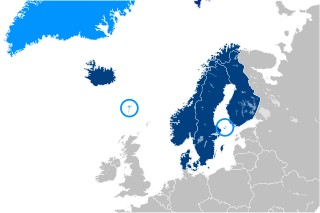Child benefit or children's allowance is a social security payment which is distributed to the parents or guardians of children, teenagers and in some cases, young adults. A number of countries operate different versions of the program. In most countries, child benefit is means-tested and the amount of child benefit paid is usually dependent on the number of children one has.
A disability pension is a form of pension given to those people who are permanently or temporarily unable to work due to a disability.

The Department for Work and Pensions (DWP) is a United Kingdom government department of His Majesty's Government responsible for welfare, pensions and child maintenance policy. As the UK's biggest public service department it administers the State Pension and a range of working age, disability and ill health benefits to around 20 million claimants and customers. It is the second largest governmental department in terms of employees, and the largest in terms of expenditure (£187bn).
Social security in Sweden is an aspect of the Swedish welfare system and consists of various social insurances handled by the National Agency for Social Insurance, and welfare provided based on need by local municipalities. Social security is the main conduit for redistribution of approximately 48% of the Swedish GDP in the form of taxed income.
Income Support is an income-related benefit in the United Kingdom for some people who are on a low income, but have a reason for not actively seeking work. Claimants of Income Support may be entitled to certain other benefits, for example, Housing Benefit, Council Tax Reduction, Child Benefit, Carer's Allowance, Child Tax Credit and help with health costs. A person with capital over £16,000 cannot get Income Support, and savings over £6,000 affect how much Income Support can be received. Claimants must be between 16 and Pension Credit age, work fewer than 16 hours a week, and have a reason why they are not actively seeking work.

The Swedish Social Insurance Agency is a government agency that administers social insurance in Sweden.
Social security, in Australia, refers to a system of social welfare payments provided by Australian Government to eligible Australian citizens, permanent residents, and limited international visitors. These payments are almost always administered by Centrelink, a program of Services Australia. In Australia, most payments are means tested.
The Disabled Students Allowance (DSA) is a Government grant in the United Kingdom (UK) available to students in Higher Education, originally established by the Department for Education and Skills (DfES).
The Disabled Persons Railcard is a concessionary fare scheme in the United Kingdom giving eligible passengers with disabilities benefits on the National Rail network including a 1/3 discount on fares.
Motability is a charity in the United Kingdom. It oversees Motability Operations Ltd, which runs the Motability Scheme intended to enable disabled people, their families and their carers to lease a new car, scooter or powered wheelchair, using their disability benefit. According to its response to a UK Government inquiry in 2019 into enhancing mobility for handicapped citizens, Motability had over 620,000 customers. According to Citizen's Advice, access to the charity's support to pay for a car is dependent on eligibility relative to mobility conditions in government schemes, including: Disability Living Allowance (DLA), Personal Independence Payment (PIP), Armed Forces Independence Payment (AFIP) or War Pensioners’ Mobility Supplement. Motability's 2019/2020 audit document reported 94% of persons using Motability's scheme to buy a car either have a physical disability or long term health condition. In 2018, the National Audit Office praised the customer satisfaction rates for the service, but criticized the profit and reserve levels the charity held. They also noted criticized its governance and "executive remuneration." A response to a 2019 parliamentary committee to release 343million pounds of its 2.5bn reserve was greeted as a "first step" to making best use of its "vast sums."
Disability Living Allowance (DLA) is a social security benefit in the United Kingdom paid to eligible claimants who have personal care and/or mobility needs as a result of a mental or physical disability. It is tax-free, non-means-tested and non-contributory. The benefit was established by the Social Security Contributions and Benefits Act 1992, integrating the former benefits Mobility Allowance and Attendance Allowance and introducing two additional lower rates of benefit. Prior to 2013 it could be claimed by UK residents aged under sixty five years. However, the benefit was phased-out for the majority of claimants between 2013 and 2015 and replaced by a new Personal Independence Payment. DLA can still be claimed by children under sixteen and can still be received by existing claimants who were aged sixty five or over on 8 April 2013.
Disability benefits are a form of financial assistance designed to support individuals who are unable to work due to a chronic illness, disease or injury. Disability benefits are typically provided through various sources, including government programs, group disability insurance provided by employers or associations or private insurance policies typically purchased through a licensed insurance agent or broker, or directly from an insurance company.
Attendance Allowance is a non-contributory Social Security benefit paid to elderly disabled people in the United Kingdom. It was introduced in the National Insurance Act 1970. The benefit is intended to provide support for those who live independently but might otherwise need to go into residential care. It is paid by the Department for Work and Pensions. The Social Security Contributions and Benefits Act 1992, integrated Mobility Allowance and Attendance Allowance into a new benefit Disability Living Allowance for people under 65.

Social security or welfare in Finland is very comprehensive compared to what almost all other countries provide. In the late 1980s, Finland had one of the world's most advanced welfare systems, which guaranteed decent living conditions to all Finns. Created almost entirely during the first three decades after World War II, the social security system was an outgrowth of the traditional Nordic belief that the state is not inherently hostile to the well-being of its citizens and can intervene benevolently on their behalf. According to some social historians, the basis of this belief was a relatively benign history that had allowed the gradual emergence of a free and independent peasantry in the Nordic countries and had curtailed the dominance of the nobility and the subsequent formation of a powerful right wing. Finland's history was harsher than the histories of the other Nordic countries but didn't prevent the country from following their path of social development.

Taxes in Spain are levied by national (central), regional and local governments. Tax revenue in Spain stood at 36.3% of GDP in 2013. A wide range of taxes are levied on different sources, the most important ones being income tax, social security contributions, corporate tax, value added tax; some of them are applied at national level and others at national and regional levels. Most national and regional taxes are collected by the Agencia Estatal de Administración Tributaria which is the bureau responsible for collecting taxes at the national level. Other minor taxes like property transfer tax (regional), real estate property tax (local), road tax (local) are collected directly by regional or local administrations. Four historical territories or foral provinces collect all national and regional taxes themselves and subsequently transfer the portion due to the central Government after two negotiations called Concierto and the Convenio. The tax year in Spain follows the calendar year. The tax collection method depends on the tax; some of them are collected by self-assessment, but others follow a system of pay-as-you-earn tax with monthly withholdings that follow a self-assessment at the end of the term.

Bituah Leumi is Israel's national social security agency.

The Welfare Reform Act 2012 is an Act of Parliament in the United Kingdom which makes changes to the rules concerning a number of benefits offered within the British social security system. It was enacted by the Parliament of the United Kingdom on 8 March 2012.

People with disability in Luxembourg have some legal protections from discrimination and their needs can be provided through various government policies. Students with disabilities have a fairly good rate of completing school compared to peers without a disability. Luxembourg signed onto the Convention on the Rights of Persons with Disabilities on March 30, 2007. Much of the country is accessible, however, there are no legal provisions for reasonable accommodations.

Social Security Scotland is an executive agency of the Scottish Government with responsibility for social security provision.
In Ireland, there are two categories of social security, contributory, and non-contributory, as well as three main types of payments:







